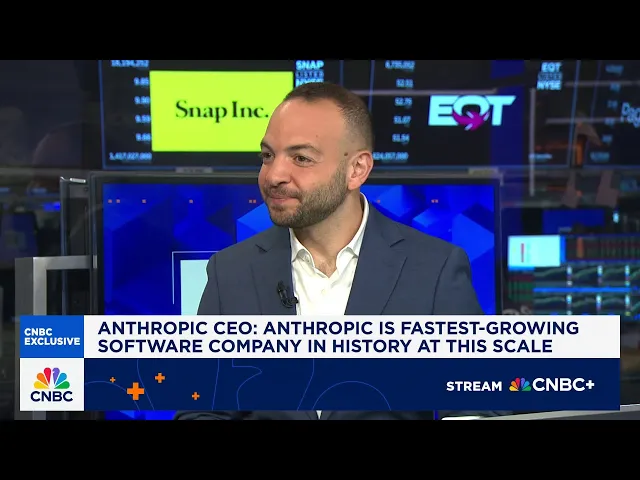As Anthropic goes, so goes the generative AI trade, says Big Technology’s Alex Kantrowitz

Anthropic's business model signals AI's commercial future
In a rapidly evolving generative AI landscape, Anthropic's strategic moves offer a glimpse into the industry's commercial trajectory. The recent CNBC interview with Big Technology's Alex Kantrowitz illuminates how Claude maker Anthropic is pioneering business models that could define AI's sustainable path to profitability. As major players like Google, Microsoft, and OpenAI compete for dominance, Anthropic's approach might serve as the canary in the coal mine for the entire sector.
Key Points:
- Anthropic has emerged as a bellwether for the generative AI industry, with their business decisions potentially indicating broader market trends and viability
- Unlike consumer-focused competitors, Anthropic is prioritizing enterprise solutions and high-value business applications where AI can deliver measurable ROI
- The company's strategic focus on safety and alignment positions them uniquely in the market, especially as regulatory scrutiny intensifies
The Enterprise Pivot: AI's True Commercial Potential
The most insightful takeaway from Kantrowitz's analysis is Anthropic's deliberate pivot toward enterprise applications rather than chasing consumer markets. This isn't merely a tactical difference—it represents a fundamental rethinking of generative AI's commercial viability. While consumer applications generate buzz and showcase capabilities, enterprises are willing to pay substantial premiums for AI that solves specific business problems.
This matters immensely in the context of the industry's broader economics. The initial wave of generative AI excitement focused primarily on consumer-facing applications and general-purpose assistants. However, the costs of training and running these models remain extraordinarily high. By targeting enterprise clients with specific use cases—document analysis, specialized customer service, or industry-specific knowledge work—Anthropic can command premium pricing that actually covers their operational costs while delivering measurable value.
This enterprise-first approach mirrors earlier technological transitions. Cloud computing, for example, gained commercial traction through enterprise adoption before becoming ubiquitous in consumer applications. Similarly, database technologies and analytics platforms found sustainable business models by solving enterprise problems first. Anthropic appears to be following this proven trajectory rather than burning capital on consumer acquisition.
Beyond the Transcript: The Regulatory Advantage
What the interview doesn't fully explore is how Anthropic's safety-focused approach might
Recent Videos
How To Earn MONEY With Images (No Bullsh*t)
Smart earnings from your image collection In today's digital economy, passive income streams have become increasingly accessible to creators with various skill sets. A recent YouTube video cuts through the hype to explore legitimate ways photographers, designers, and even casual smartphone users can monetize their image collections. The strategies outlined don't rely on unrealistic promises or complicated schemes—instead, they focus on established marketplaces with proven revenue potential for image creators. Key Points Stock photography platforms like Shutterstock, Adobe Stock, and Getty Images remain viable income sources when you understand their specific requirements and optimize your submissions accordingly. Specialized marketplaces focusing...
Oct 3, 2025New SHAPE SHIFTING AI Robot Is Freaking People Out
Liquid robots will change everything In the quiet labs of Carnegie Mellon University, scientists have created something that feels plucked from science fiction—a magnetic slime robot that can transform between liquid and solid states, slipping through tight spaces before reassembling on the other side. This technology, showcased in a recent YouTube video, represents a significant leap beyond traditional robotics into a realm where machines mimic not just animal movements, but their fundamental physical properties. While the internet might be buzzing with dystopian concerns about "shape-shifting terminators," the reality offers far more promising applications that could revolutionize medicine, rescue operations, and...
Oct 3, 2025How To Do Homeless AI Tiktok Trend (Tiktok Homeless AI Tutorial)
AI homeless trend raises ethical concerns In an era where social media trends evolve faster than we can comprehend them, TikTok's "homeless AI" trend has sparked both creative engagement and serious ethical questions. The trend, which involves using AI to transform ordinary photos into images depicting homelessness, has rapidly gained traction across the platform, with creators eagerly jumping on board to showcase their digital transformations. While the technical process is relatively straightforward, the implications of digitally "becoming homeless" for entertainment deserve careful consideration. The video tutorial provides a step-by-step guide on creating these AI-generated images, explaining how users can transform...
